In the past, eCommerce platforms were super expensive, which kept small businesses from creating online stores. Luckily, now, there are plenty of eCommerce platforms that offer free or low-cost options.
At WPBeginner, we have helped our readers and clients sell their products on WooCommerce, which is free to use. Plus, several of our partner brands use Easy Digital Downloads, which offers a free version, to sell WordPress plugins. We’ve found these platforms to be beginner-friendly, scalable, and reliable.
However, we understand that they may not be the perfect fit for everyone. That’s why we also tested other popular eCommerce solutions.
In this article, we will compare the best affordable and free eCommerce platforms that you can use to start an online store. Let’s dive right in!
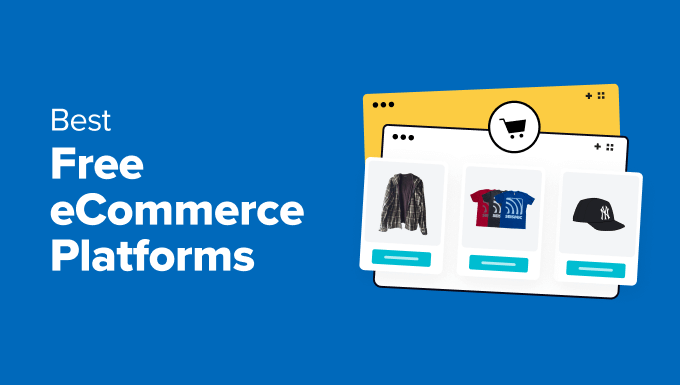
Quick Overview: Best Affordable and Free eCommerce Platforms
If you are in a hurry, then here’s a quick overview of the best free eCommerce platforms.
| # | Platforms | Best For | Pricing |
|---|---|---|---|
| 🥇 | WooCommerce | All-in-one solution | Free |
| 🥈 | Web.com Website Builder | Beginner-friendly + affordable + inventory management features | $19.99/month |
| 🥉 | BuyNow Plus | Adding “buy now” buttons | Free |
| 4 | BigCommerce | Creating a medium-sized store | $29.95/month + Free trial |
| 5 | Shopify | Building a fully hosted eCommerce store + integrated shipping solutions | $25/month + Free trial |
| 6 | Weebly | Starting your eCommerce business fast + beginners | $10/month + Free |
| 7 | BigCartel | Selling handmade products | $15/month + Free |
How We Test And Review Free eCommerce Platforms
Let’s be honest: there is no such thing as a 100% free eCommerce platform.
Even when the eCommerce platform itself is free, you will have to pay for a domain, web hosting, payment processing fees, and other extension costs.
We have a detailed guide on the real cost of building eCommerce websites.
With that said, your goal should be to find an eCommerce platform that helps you get started at the lowest cost without putting severe limitations on how you run or grow your business.
To give our readers reliable recommendations, we tested the most popular eCommerce platforms in real time. When we were doing that, we particularly focused on the following factors:
- Features: We assessed the core features each platform offers, such as product management, payment processing, and shipping options.
- Ease of Use: We evaluated the user-friendliness of the platform, including the initial setup process and the day-to-day management tasks.
- Customization and Design: We checked the flexibility offered in terms of design templates and customization options, ensuring users can tailor the appearance of their online store to match their brand identity.
- Scalability: We considered the platform’s ability to scale with your business as it grows, looking at potential upgrade paths and the ability to handle increased traffic and larger product catalogs.
- Integration and Compatibility: We evaluated how well the platform integrates with third-party tools, such as marketing, CRM, and accounting software, to support business operations.
- User Feedback: We checked feedback from current users to gather insights into real-world experiences, focusing on any challenges they reported.
Why Trust WPBeginner?
WPBeginner is made up of a team of experts with years of experience in WordPress, eCommerce, SEO, online marketing, hosting, and more.
When it comes to recommending the best affordable and free eCommerce platforms, we prioritized tools that are beginner-friendly, scalable, and optimized for online success.
Our team has thoroughly tested each platform to provide reliable recommendations tailored to small businesses, startups, and entrepreneurs.
We have also recommended tools like WooCommerce, which we have used and tested regularly ourselves to build eCommerce stores.
To learn more, see our editorial process.
1. WooCommerce

WooCommerce is the best all-in-one eCommerce plugin for selling any type of product. It’s a completely free open-source platform that you can download and run on any web hosting provider.
In the past, we have used WooCommerce on plenty of demo sites and have found it to be super beginner-friendly. To learn more about our experience, see our WooCommerce review.
One of the key advantages of WooCommerce is its intuitive interface, which makes it accessible for everyone. Store owners can easily add products, manage inventory, set pricing, and process orders without requiring advanced technical knowledge.
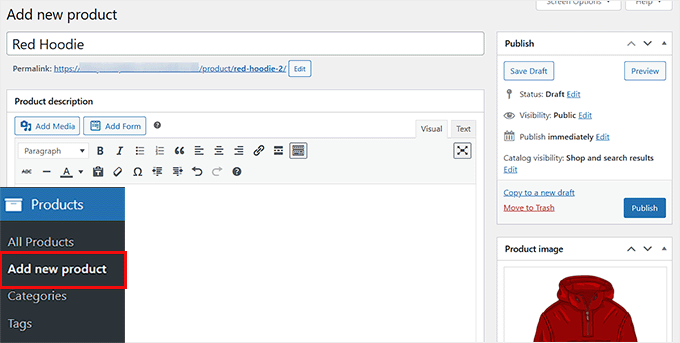
Its product management features also include options for product variations, such as sizes and colors, and advanced inventory tracking so you can stay organized and ensure smooth operations.
Other than that, WooCommerce offers a wide range of shipping and payment options. You can offer free shipping, flat-rate shipping, or real-time shipping calculations through integrations with USPS, FedEx, and UPS.
Additionally, you can integrate it with multiple payment gateways, including PayPal, Stripe, and direct bank transfers.
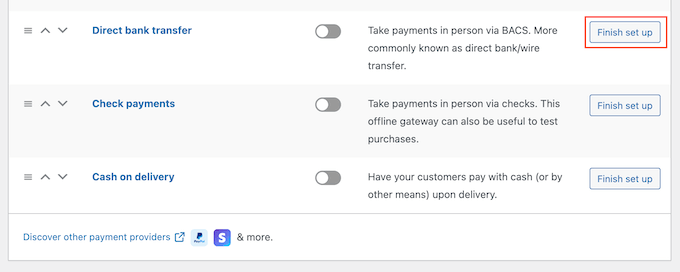
During our testing, we discovered that you can even connect WooCommerce with advanced reporting tools like MonsterInsights to track sales, customer behavior, and inventory trends to make informed decisions about your business.
For details, see our tutorial on how to set up WooCommerce conversion tracking.
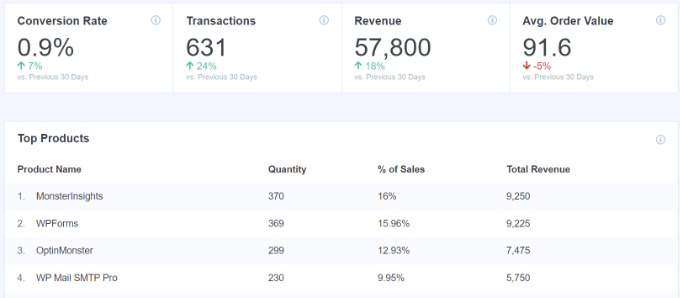
However, since WooCommerce doesn’t provide hosting, you’ll need to buy web hosting and a domain name to ensure that your website can be accessed by users worldwide.
We recommend using either Bluehost or SiteGround. They are both among the largest hosting companies in the world and are officially recommended by WooCommerce.
Bluehost is even offering WPBeginner users a free domain name + SSL certificate and a generous 83% discount on hosting. Basically, you can get started for $1.99 per month.
→ Claim This Exclusive Bluehost Deal ←
Pros of WooCommerce:
- We found it super easy to get started with WooCommerce. You can create an online store quickly, even if you’re a total beginner.
- You’ll be hosting your website yourself, which gives you full control. Although you’ll need to pay for WooCommerce hosting, this doesn’t have to cost a lot.
- There are loads of WooCommerce themes (designs), giving you the opportunity to create a store that truly reflects your brand.
- There are thousands of WooCommerce plugins that you can use to add new features and grow your business.
- During our testing, we realized that you can sell anything with WooCommerce, including physical products, digital downloads, membership plans, dropshipping stores, and affiliate products.
- You can add unlimited products to your store, which gives you the freedom to grow your eCommerce business as big as you want.
- We love that WooCommerce doesn’t charge transaction fees. You’ll only have to pay your payment service provider, like PayPal or Stripe, or your bank.
- WooCommerce gives you all the capabilities to rank your pages. It is a plugin from WordPress, so it’s built on top of the best content management system. That means you’ll have access to plenty of SEO and blogging tools to drive more traffic to your store.
Cons of WooCommerce:
- If you’re a total beginner, WooCommerce has a bit of a learning curve and can be trickier to get started with than some other options. You’ll need to buy hosting and a domain name, for instance.
- You’ll be responsible for maintaining your online store as it grows. This might mean upgrading your hosting plan, optimizing your WordPress site for SEO, or paying for a security plugin.
Why we recommend WooCommerce: If you are just starting out, then WooCommerce is the best solution for you. It is free, offers amazing features, and doesn’t charge any transaction fees.
To help beginners get started, we have the most detailed WooCommerce tutorial on the web that helps you build an eCommerce website with WooCommerce.
2. Web.com Website Builder
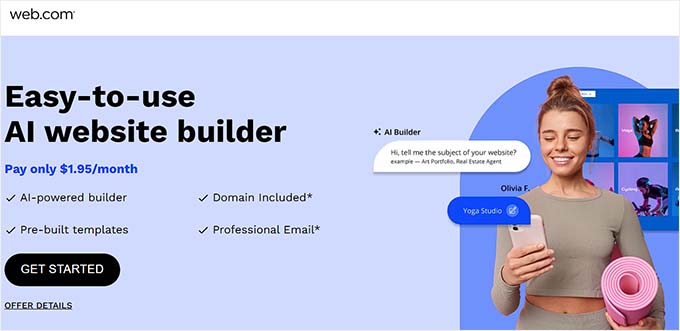
Web.com Website Builder is an excellent beginner-friendly solution that handles hosting, domain registration, SSL certificate, and online store creation for you. Since it has comprehensive inventory management features, we recommend it if you need to sell physical products in your online store.
When we were evaluating the platform, we found that it simplifies the process of launching an eCommerce store by bundling these services into one convenient package, making it ideal for beginners and small business owners.
Web.com is super easy to use. With its drag-and-drop builder, you can quickly create a professional-looking online store without any coding skills.
Plus, the platform offers a wide range of customizable templates designed for eCommerce, allowing you to showcase your physical products in a visually appealing way.
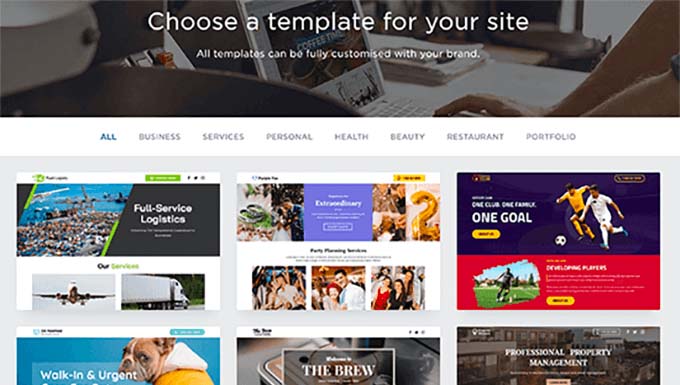
It also allows you to easily add product listings with detailed descriptions, images, and pricing. You can also manage inventory, track orders, and offer flexible shipping options to meet customer needs.
Additionally, we were super impressed that Web.com includes marketing tools to help you grow your store. It makes it super easy to optimize your site for SEO, email marketing, and social media integration, helping you drive traffic to your store.

Keep in mind that the platform doesn’t have a free version, but it offers a very affordable plan that allows you to create an online store without spending a lot of money.
Pros of Web.com Website Builder:
- You can build an online store with Web.com drag & drop website builder. You can get a free custom domain name of your choosing.
- You can sell both physical and digital products through your store. You can use Web.com to track your inventory.
- We liked that 24/7 email and live chat support are available.
- Our evaluation revealed that Web.com lets you add a blog to your store’s website for free, though the blogging software is very basic and doesn’t offer the same features as a blogging platform like WordPress.
Cons of Web.com Website Builder:
- Pricing starts at $34.99 per month for the eCommerce Essentials plan.
- The eCommerce features are not as powerful as WooCommerce or Shopify.
Why we recommend Web.com Website Builder: If you’re looking for a solution that handles both your hosting and domain, as well as allows you to build an online store, then Web.com could be the ideal choice for you.
3. BuyNow Plus
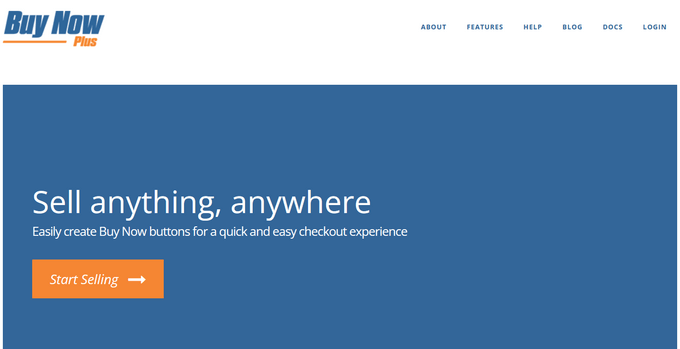
BuyNow Plus is not a full eCommerce platform. Instead, it lets you create “buy now” buttons that you can add on any website, social media pages, or other online platforms. This makes it a great option if you don’t need all the advanced features of a full-blown online store.
Upon research, we realized that, unlike full-fledged eCommerce systems that require setting up entire stores, BuyNow Plus focuses solely on allowing direct sales through customizable buttons. This makes it an excellent choice for creators, freelancers, and small business owners who need a lightweight tool to start accepting payments online.
The platform is particularly ideal for those who want to sell directly through social media, email campaigns, or landing pages. For example, if you are promoting a product on Instagram or Facebook, you can generate a “buy now” button link with BuyNow Plus and share it with your audience.
This eliminates the need for setting up complex checkout pages or redirecting customers to a separate storefront, allowing for faster transactions. However, keep in mind that you will need a free Stripe account in order to use BuyNow Plus.
Pros of BuyNow Plus:
- We like that the transaction fee is pretty low at 3% per transaction. Remember that Stripe charges its own transaction fees on top of this, though.
- You can use BuyNow Plus to handle recurring credit card payments without your customers needing to set up an account. This is a really handy feature if you’re selling recurring memberships for offline items.
- You can post the button links on social media and your website, or you can use them in emails.
- During our investigation, we found that there is no limit to how many different products you can sell using BuyNow Plus.
Cons of BuyNowPlus:
- BuyNow Plus doesn’t offer anything extra, like inventory management or a store builder.
- You could do something similar by using Stripe directly on your website. That way, you wouldn’t need to pay BuyNow Plus’s transaction fee. You’d need your own SSL certificate, but you can get one for free.
Why we recommend BuyNow Plus: This is the perfect solution if you don’t want to create a full-fledged online store and just want to add a payment button for your products or services.
4. BigCommerce

BigCommerce is the ideal eCommerce platform for midsize businesses and fast-growing online stores that need powerful features without the complexity. It is an all-in-one, fully hosted solution that covers everything from secure web hosting and seamless payment processing to advanced inventory management.
When we were evaluating the tool, we discovered that BigCommerce also offers a plugin that integrates seamlessly with your existing WordPress site, allowing you to use both tools together.
BigCommerce includes essential tools like multi-channel selling, abandoned cart recovery, and reporting to help grow your store. Plus, we love how you can easily list and sell products across multiple marketplaces, such as Amazon, eBay, Walmart, Facebook, and Instagram, all from one centralized dashboard.
While BigCommerce doesn’t offer a free plan, it provides a free trial so you can explore its features and set up your online business without paying anything.
Pros of BigCommerce:
- We like the fact that you don’t have to enter any credit card details to take the free trial.
- BigCommerce is really easy to use. You can sign up, enter details about your store, and start adding products.
- When we were building an online store with BigCommerce, we discovered that you can get a free domain like mystore.mybigcommerce.com if you don’t want to pay for a custom domain name.
- BigCommerce gives you plenty of different ways to take payments. It has built-in integration with lots of payment platforms, including PayPal powered by Braintree, Stripe, Authorize.net, and more.
- There are lots of third-party apps that you can add to your BigCommerce store to extend its functionality.
- There are lots of pre-built templates and themes to give your storefront a professional look.
Cons of BigCommerce:
- We didn’t like that the free trial lasts only 15 days, which doesn’t give you long to start making money from your store.
- BigCommerce is an all-in-one platform, which means you’re limited to using their addons and themes. You won’t have the range of choices that you’d have with some other eCommerce solutions.
Why we recommend BigCommerce: If you are looking for a powerful option that fully hosts your website, offers attractive templates, and integrates well with third-party tools, then you can opt for BigCommerce.
Related: See our comparison of WooCommerce vs BigCommerce for more details.
5. Shopify

Shopify is designed for small to medium-sized businesses that want to launch and scale their online stores with ease. It’s fully hosted so that drastically simplifies the setup process. The platform is ideal for selling physical products because of its secure payment processing and integrated shipping solutions.
It’s known for its user-friendly interface, extensive range of customizable themes, and powerful tools for managing products. One standout feature of Shopify is its 14-day free trial, which allows potential users to explore the platform and set up a store without requiring a credit card upfront.
Additionally, we love its wide range of third-party integrations that allow extensive customization and enhanced functionality.
Shopify also provides powerful inventory management tools, making it easy to track stock levels and fulfill orders efficiently.
Pros of Shopify:
- It’s really easy to get started with Shopify. Their website builder has a drag and drop interface, which means even total beginners can create a great-looking online store.
- If you want to add extra features to your store, there’s an app marketplace with lots of add-ons that you can buy.
- There’s 24/7 support available through live chat, phone, email, and Twitter.
- Shopify Payments (Shopify’s built-in payment gateway) charges 2.9% plus 30 cents per transaction. Since this is a built-in feature, which has the same price as Stripe or other payment processors, this makes it easier for users to get started.
Cons of Shopify:
- We didn’t appreciate that Shopify charges a 2% transaction fee if you use payment gateways like PayPal or Stripe. This is on top of the fee charged by the third-party payment gateway.
- The free trial only lasts 3 days. After that, you’ll need to move on to a paid plan. While the cheapest is normally $29/month, it is currently discounted to just $1 for the first 3 months.
Why we recommend Shopify: It is an ideal platform for users who want to quickly launch an online store without needing technical knowledge. It is also well-suited for small business owners.
Related: For more details, see our comparison of Shopify vs WooCommerce.
6. Weebly

Weebly is a great eCommerce platform if you are looking to launch a side hustle, thanks to its intuitive tools and affordable pricing. It’s easy to use and super accessible, making it an excellent choice for beginners who want to get started quickly.
One of its key advantages is the free trial, which allows you to explore the platform, design your store, and get a feel for its features without any financial commitment.
We particularly appreciate the platform’s drag and drop website builder, which makes creating an online store super easy, even for those with no technical expertise. With a wide variety of templates tailored to different industries, you can quickly build a site that matches your brand’s niche.
Plus, Weebly includes built-in marketing tools, such as email campaigns, SEO optimization, and social media integration, enabling you to reach a wider audience. It even has some basic analytics features that let you track your store’s performance and make data-driven decisions.
Pros of Weebly:
- You can add any kind of physical or digital products to your store
- We found the drag and drop interface easy to build your site and manage items in your store.
- We love that there are around 100 different themes (designs) you can choose from, so you should be able to find something just right for your site.
- Built-in checkout, inventory, shipping, and taxes management features.
- As well as the community forum, the free plan gives you access to live chat, email, and even phone support.
- If you do want to upgrade to a paid plan, these are affordable even for very small businesses and startups. The Professional plan starts at $12 per month, paid annually.
Cons of Weebly:
- Weebly charges a 3% transaction fee, which is in addition to the transaction fee your payment gateway charges.
- If you’re on the free or Personal ($10/month) plans, Weebly will show ads and branding from Square, Weebly’s parent company.
- Even with the paid starter plan, you are limited to selling only 25 products at a time.
Why we recommend Weebly: This is a great option for beginners who are looking to start their eCommerce business. Weebly is user-friendly and has premade templates and marketing tools, making it a great choice.
7. Big Cartel

Big Cartel is a hosted eCommerce platform designed especially for artists and creatives. It could be a great option for you if you want to have a store selling handmade goods or similar products.
Unlike some more complex platforms, Big Cartel offers a simple and straightforward setup process.
It also has a free plan for those just getting started, which allows users to list up to five products. Paid plans provide more features, such as the ability to sell unlimited products, access to advanced customization options, and tools for managing inventory, promotions, and sales.
Pros of Big Cartel:
- We like that the free plan doesn’t have any transaction fees. You will need to pay Stripe or PayPal fees, though (these are the only options Big Cartel offers for payment processing).
- Your free shop URL can be customized. It has to be in the format name.bigcartel.com, but you can choose whatever you want for the name. Many other platforms assign you a specific URL based on your username or store name, and you can’t change it.
- It’s quick to set up your store and easy to add your products. Big Cartel walks you through the process step by step.
- The free plan comes with features like real-time analytics and marketing tools to run promos and discounts.
Cons of Big Cartel:
- If you want to customize your website theme, you’ll need to edit the theme’s HTML. This is definitely less beginner-friendly than most other eCommerce platforms.
- The free plan only has limited features. You need to upgrade to a paid plan if you want to use things like inventory tracking or discount codes.
Why we recommend Big Cartel: If you are just starting with your small business, then it is a great choice.
Choosing the Best Free eCommerce Platform
So, which is the best free eCommerce platform for you? That depends on what you’re looking for.
If you want to start cheap and have full freedom to grow your business, then WooCommerce is the best option. The plugin is made for selling, and includes all the features you need to build a responsive store fast.
With over 100 payment gateways, plenty of SEO tools, and powerful analytics, it’s arguably the most robust eCommerce platform out there.
Using our exclusive Bluehost deal, you can get started for $1.99 per month. That’s less than a cup of coffee.
If you want to use a non-WordPress eCommerce platform that’s affordable, then take a look at Web.com website builder. It’s easy to use and quite affordable when compared to Shopify or BigCommerce. However, it is limited in terms of features and flexibility that you get with other platforms.
If you want to try out an online store for free but you’re happy to pay for something that’s a good fit for your business, then BigCommerce and Shopify are great full-featured options.
💡 Bonus Tip: If building and designing an online store feels overwhelming, then don’t worry, we’ve got you covered!
WPBeginner is now offering Website Design Services with super affordable pricing options. We handle everything from hosting and domain setup to design, SEO, and more. With over a decade of WordPress experience, we will create the perfect WordPress store for you, making the entire process stress-free.
For more details, see our WPBeginner Pro Services page.
FAQs: Best Affordable and Free eCommerce Platforms
Here are some questions that are frequently asked by our readers about affordable and free eCommerce platforms:
Which free eCommerce platform offers the best design options?
In our expert opinion, WooCommerce offers the most flexibility in design, especially when paired with WordPress themes. With thousands of free and premium themes available, you have complete control over the look and feel of your store.
Plus, you can customize the design further with plugins if needed, making it ideal for those who want full creative control.
On the other hand, Shopify also provides an excellent selection of customizable themes. It’s user-friendly with its drag and drop editor, allowing for easy adjustments without needing coding skills.
What’s the difference between hosted and self-hosted eCommerce platforms?
Hosted eCommerce platforms are all in one solutions where the platform takes care of hosting, updates, security, and maintenance for you. Its popular examples include Shopify and BigCommerce.
These platforms are easy to use, require little technical knowledge, and typically charge a monthly fee along with transaction costs.
Self-hosted eCommerce platforms like WooCommerce require you to manage hosting, domain, security, and updates yourself. While this offers more flexibility and customization, it also demands more work. You can choose your hosting provider and have complete control over your store, but you’ll need to handle more of the setup and maintenance.
Can I use these platforms for international selling?
Yes, you can use many free eCommerce platforms for international selling. They support multi-currency, international shipping, and various payment gateways, making it easy to sell globally.
However, some limitations may exist on certain free plans, so it’s important to review each platform’s features to ensure they meet your international selling needs.
How do free eCommerce platforms make money?
Free eCommerce platforms make money primarily through transaction fees, paid add-ons, and premium plans. They often charge a percentage of each sale or a fixed fee for payment processing. Additionally, they generate revenue by selling extra features like advanced themes, plugins, marketing tools, or hosting services. Some platforms also offer paid upgrades for more customization and support options.
We hope this article helped you learn about the best free eCommerce platforms to get started with.
Related Guides to eCommerce Platforms
- WordPress eCommerce Setup Guide for Beginners (7 Product Types)
- How To Properly Set Up eCommerce Tracking In WordPress
- Is WordPress Good for eCommerce? (Pros and Cons)
- eCommerce Website Maintenance Tips – How to Maintain Your Store
- How to Speed Up Your eCommerce Website (Proven Tips)
- Profitable Ecommerce Business Ideas for WordPress (Expert Pick)
- The Ultimate eCommerce Launch Checklist for WordPress
If you liked this article, then please subscribe to our YouTube Channel for WordPress video tutorials. You can also find us on Twitter and Facebook.





Jiří Vaněk
Thank you for the excellent list of services that can be used for ecommerce and for the comparison. Besides WordPress and WooCommerce, I only have experience with Shopify. I’d definitely like to expand my knowledge and try out some of the other services in the ecommerce space. So far, I’ve only been using WordPress and Woo because Shopify didn’t give me as much freedom in deciding on features. Perhaps these other services will be better in that regard, and I’m eager to explore them further.
Mrteesurez
Bigcommerce and Shopify are seems to be recommendable after Woocomerce, the best ever, and also for if you can not afford to buy hosting plan and custom domain, although you will not have full control over the store but it will just get you started and sell your products online.
Thanks for this head to head ecommerce platforms comparisons.
WPBeginner Support
You’re welcome
Admin
Moinuddin Waheed
woocommerce is the best option for e-commerce websites.
This is a powerful tool with all the features and options to make awesome online store.
since it is a plugin and works on top of WordPress, it becomes easy for wordpress users to work with same set of wordpress knowledge and scale.
It comes with integrations with lots of important services.
Appreciate the efforts to make a comparative analysis of all the options.
Kathie
Want to get more informed on the options and this was a great start❣️
Thank you!
WPBeginner Support
You’re welcome!
Admin
Kiran Patil
Very Informative .
WPBeginner Support
Thank you
Admin